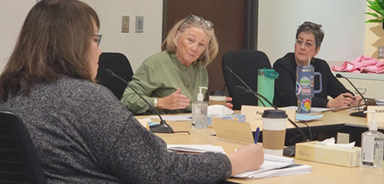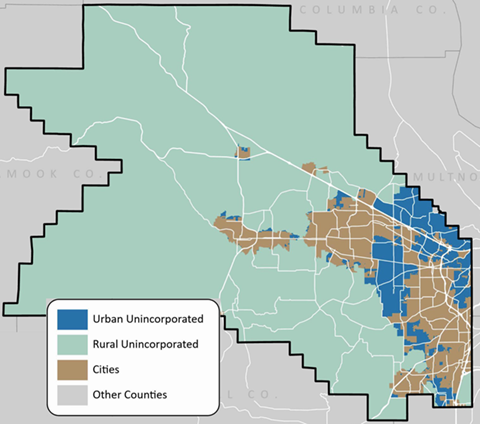Washington County News May 2025

- Doubletree Transitional Housing
- Clean Water Services executive staff under scrutiny
- LUT Workplan
- Urban Services Framework Project
Doubletree Transitional Housing

In March, Washington County Housing Services purchased the building near the intersection of Cornell and Highway 26 that was the former site of the Doubletree Hotel. It will be used as “Transitional Housing” which provides a way forward for individuals and couples struggling with homelessness or housing instability. The “Cornell Road Recovery Community” will be a clean and sober living environment that requires sobriety for people who want to work toward housing stability. “Transitional housing provides robust services onsite, 24/7 staffing and security, and a goal of helping residents transition to stable, long-term housing within two years.”
The site will require significant renovations over the next year to prepare it for its new purpose. Emily Roots, Housing Communications Coordinator, says, “Central City Concern is supporting us as a subject matter expert as we move through the development process. We will complete a competitive process to select the on-site service provider later this year. No programming will be offered for at least a year, as the building is remodeled, and the program is designed. The site is estimated to open in mid-to-late 2026.”
Roots says that housing staff will engage with neighborhood community partners, including Oak Hills HOA and CPO 1. “Community engagement will include an opportunity to meet on-site service providers, tour the site, ask questions, and share input on how best to engage with neighbors in the future. This process will also include the development of a Good Neighbor Agreement (also referred to as a Neighborhood Plan) created jointly between the neighbors and the program operators. We look forward to working with the community as we advance housing solutions with options of all shapes and sizes.”
Clean Water Services executive staff under scrutiny
In March, The Oregonian newspaper published an article revealing the surprisingly lavish trips, paid for by our sewer bills and property taxes, that at least eight members of Clean Water Services (CWS) top staff have been taking every year to Hawaii.
The Board of Directors of CWS is made up of the Board of County Commissioners (BCC). Following the critiques published by The Oregonian and The Hillsboro Herald, on April 11 the BCC voted to adopt new oversight measures for the agency.
CWS sent out an email in April to subscribers of their “Clean Water Connection” newsletter acknowledging the controversy. “We know recent media coverage has shaken public trust in CWS, and we are dedicated to rebuilding that trust and demonstrating how we are investing your ratepayer dollars to contribute to a livable community and healthy environment.”
“The CWS Board of Directors has laid out required steps to increase oversight and accountability. We have also posted public statements from the Board and from CEO Diane Taniguchi-Dennis on our website, as well as a Frequently Asked Questions page. If you have questions or concerns, we encourage you to share them with our leadership by emailing cwsboard@cleanwaterservices.org.”

during a BCC Work Session in April. Pam
Treece (center) is our commissioner, and
Kathryn Harrington (right) is the chair.
They also invite the public to comment on the upcoming Fiscal Year 2025-26 budget. “The CWS Budget Committee will review the proposed Fiscal Year 2025-26 Budget and make its recommendation to our Board of Directors on Friday, May 9. The CWS Board will conduct a public hearing and consider adopting the budget on Tuesday, June 17. Our proposed budget will be posted at cleanwaterservices.org/budget by the end of April, as will information on how to participate.”
Another meeting between the BCC/CWS board and Diane Tanaguchi-Dennis (CWS CEO) on April 30 revealed that BCC members were not satisfied by Tanaguchi-Dennis’ responses and wanted more concrete steps sooner. Read Dirk Knudsen’s report in his Hillsboro Herald for more details.
LUT Workplan
The Washington County Department of Land Use and Development (LUT) has published a draft Planning Work Program for 2025-27 and invites the public to review the work proposed for Community Planning, Transportation Planning, and Development Review/Current Planning divisions.

The online Open House includes “tables” on Housing Production and Affordability; Natural Resources and Climate Change; Multimodal Transportation Planning; Plan and Development Code Updates; and Fiscal Responsibility. Community members can visit the tables to learn about the issues and then provide feedback. The Open House ends at 5 pm on May 30.
The draft Work Plan can be downloaded here. “Tier One” projects are very likely to happen, while “Tier Two” tasks may not be addressed within the two-year span of the Work Plan.
The final plan will determine what projects LUT staff will work on, what degree of staff time is required, whether the work will result in new ordinances, and how and when the public will be involved. All comments received by May 30, will be provided to the Washington County Board of Commissioners prior to adoption of the final work program.
Urban Services Framework Project
Washington County and the cities of Beaverton and Tigard are partnering on the new the Urban Services Framework Project (USFP) which will study how urban services, such as street maintenance, fire protection, parks/recreation, drinking water and sewer/stormwater, are provided in urban unincorporated Washington County.

About 35% of Washington County’s residents live within Metro’s Urban Growth Boundary and outside any city municipal government’s boundaries. In these urban unincorporated areas, urban services are provided by the County or special service districts. The Cedar Mill community includes both urban unincorporated areas and land in the city of Beaverton boundaries.
The USFP, funded through a federal grant, comes at a time when local government funding is constrained. County staff say they understand that the availability and cost of urban services for residents and businesses in both the cities and unincorporated urban Washington County impacts livability.
“This project is a fact-finding mission to identify if the current way of providing services is the most effective and efficient,” said Carol Johnson, Manager, LUT Planning and Development Services Division. “The technical analysis will look at how urban services are provided now, including the cost, the condition of facilities and infrastructure, and policy and legal requirements.”
The impact on the level and cost of service will be evaluated for different scenarios to provide services and for different case study areas around Washington County. In addition, the study will identify the process for an area to incorporate into its own city.
Project partners selected case study areas with the goal of looking at areas with differing urban service providers, age and conditions of infrastructure and redevelopment potential. The case study areas are: Bethany, Cedar Hills West, Raleigh Hills and Garden Home in the Beaverton area; and Metzger and Bull Mountain in the Tigard area. Although Cedar Mill was not selected as a case study area, lessons learned from this technical analysis may be applied to Cedar Mill and other areas.
The USFP is expected to take about 18 months. Technical findings can inform next steps and a framework for decisions on future urban services.





